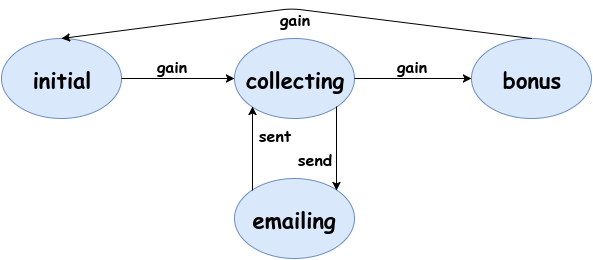Workflow as FSM
A finite-state machine (FSM) or finite-state automaton (FSA, plural: automata), finite automaton, or simply a state machine, is a mathematical model of computation. It is an abstract machine that can be in exactly one of a finite number of states at any given time.
The FSM can change from one state to another in response to some external inputs; the change from one state to another is called a transition.
An FSM is defined by a list of its states, its initial state, and the conditions for each transition.
Wikipedia
Wikipedia provides a coin-operated turnstile as an example of state machine:
Even from this example it’s clear that the definition above is not accurate.
To be precise, the statement “the change from one state to another is called
a transition” is actually incomplete. Check the push transition when the state
is locked and coin transition when the state is unlocked. Both do not change
the state.
This terminology inaccuracy leads to misunderstanding of how FSM should be built to become a friend of a developer, not an enemy to fight against.
Bonus program tracking (naïve approach)
Let’s imagine we have a bonus program to be developed for our clients. Each
client receives a fixed number of bonus points for each subsequent action,
and, as soon as the total amount reaches some value, the customer is awarded
with something fruitful. We want to implement bonus as a model, evidently
having three states: :initial, :collecting and :bonus. The naïve FSM
would look like:

Each subsequent bonus point moves us towards :bonus state. The code, supporting
this workflow could look somewhat like below (I am using
workflow gem here, but it really does not
matter.)
workflow do
state :initial do
event :gain, transitions_to: :collecting
end
state :collecting do
event :bonus_reached, transitions_to: :bonus
end
state :bonus do
event :restart, transitions_to: :initial
end
end
def coins_gained!(amount)
@coins = @coins.to_i + amount
if @coins >= 100
bonus_reached!
@coins -= 100
restart!
end
end
Right?—Unfortunately, no. This is not a robust workflow. It shifts too much of
it’s duties elsewhere. It does not control intermediate state (:collecting)
properly. Imagine, two days after launch we were asked by our marketing department
to email customers when their points amount reaches 20 and 50 points. What would
we do?—Yes, we would blow our coins_gained! method up:
def coins_gained!(amount)
old_amount = @coins.to_i
new_amount = old_amount + amount
if old_amount < 20 && new_amount >= 20 ||
old_amount < 50 && new_amount >= 50
send_email_to_customer
end
@coins = new_amount
if @coins >= 100
bonus_reached!
@coins -= 100
restart!
end
end
Yeah, yeah, I know that the whole checking and sending email might be extracted to it’s own method, as we always do in Rails making our models finally to contain a dozillion of private helpers calling other private helpers to satisfy rubocop with her 10-LOC-per-method-body limit.
Better approach
The real issue is: our workflow is not robust. There is a transition we
missed: noop from :collecting to :collecting state:

The workflow transitions are now named properly in the first place.
workflow do
state :initial do
event :gain, transitions_to: :collecting
end
state :collecting do
event :gain, transitions_to: :collecting
event :bonus_reached, transitions_to: :bonus
end
state :bonus do
event :restart, transitions_to: :initial
end
end
Better?—Yes, but still not perfect:
def gain(amount)
@coins = @coins.to_i + amount
bonus_reached! if @coins >= 100
end
def bonus_reached
@coins -= 100
restart!
end
def on_transition(amount)
send_email_to_customer if need_email? # encapsulated check
end
The code is now clean, no explicit if on checking what state to be next exists,
the email will be sent despite the target state. What could be improved?—Well,
sending email is also a state.
Overdesigned approach
Should not we also introduce a particular state for “sending an email”?

The answer is: no, we probably shouldn’t. It will just make things cumbersome, it will implicitly require more unnecessary checks, it will make the transitions less explicit:
def gain(amount)
...
emailing! if need_email?
# what if bonus is reached?
...
end
def emailing
send_email_to_customer
email_sent!
# back to collecting ⇒ void transition implies
# potential glitches when
# handlers are implemented
end
Conslusion
When some action is taken place from outside, it should be covered with transition. Even if it’s same-state transition.
When the action is completely internal, it does not deserve it’s state.